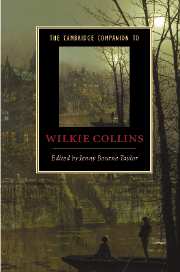Book contents
- Frontmatter
- Introduction
- 1 Collins’s career and the visual arts
- 2 The early writing
- 3 Collins’s shorter fiction
- 4 Collins and the sensation novel
- 5 The Moonstone, detective fiction and forensic science
- 6 The later novels
- 7 The professional writer and the literary marketplace
- 8 The marriage plot and its alternatives
- 9 Collins and Victorian masculinity
- 10 Collins and empire
- 11 Disability and difference
- 12 Collins and the theatre
- 13 The afterlife of Wilkie Collins
- Further reading
- Index
- Series List
5 - The Moonstone, detective fiction and forensic science
Published online by Cambridge University Press: 28 January 2007
- Frontmatter
- Introduction
- 1 Collins’s career and the visual arts
- 2 The early writing
- 3 Collins’s shorter fiction
- 4 Collins and the sensation novel
- 5 The Moonstone, detective fiction and forensic science
- 6 The later novels
- 7 The professional writer and the literary marketplace
- 8 The marriage plot and its alternatives
- 9 Collins and Victorian masculinity
- 10 Collins and empire
- 11 Disability and difference
- 12 Collins and the theatre
- 13 The afterlife of Wilkie Collins
- Further reading
- Index
- Series List
Summary
One source of the power of Wilkie Collins's The Moonstone (1868), like the diamond at its heart, is the complex range of interpretations the novel inspires. If the diamond stands, alternatively, as a sign of religious devotion, imperial plunder, colonial revenge, capitalist desire, personal vengeance, sexual experience or psychological integration, the novel equally invites an array of interpretations: it is an orientalist romance, a critique of imperialism, an inheritance plot, an allegory of seduction and, as was most famously claimed by T. S. Eliot, the first and the greatest of modern English detective novels. Regardless of the myriad interpretative meanings the novel offers, however, its narrative force and logic are clear: The Moonstone is an elaborate act of historical detection and reconstruction. By way of an intricate collective narrative performed by a series of individuals who explicitly present their case like witnesses in a trial, this novel dramatises a sustained effort to recover a lost incident, connecting contemporary circumstances with historical origins, and assembling a 'chain of evidence' that will link the present to the past by explaining the truth about a mysterious sequence of events (p. 342). In its complex narrative and in the unfolding of its even more complicated plot, The Moonstone did in fact become the prototypical English detective novel.
- Type
- Chapter
- Information
- The Cambridge Companion to Wilkie Collins , pp. 65 - 78Publisher: Cambridge University PressPrint publication year: 2006
- 3
- Cited by



